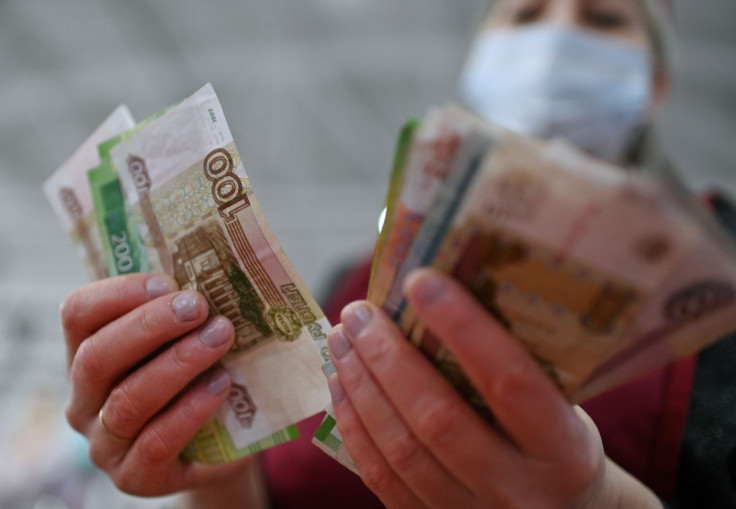Rouble Recovers, Stocks Slide After Putin Sends Troops To Breakaway Ukraine Regions

The rouble recovered from a near two-year low in volatile trading while Russian stocks slumped on Tuesday after President Vladimir Putin ordered troops to two breakaway regions in eastern Ukraine after recognising them as independent.
Putin's announcement on Monday drew immediate international condemnation and the West is now expected to announce new coordinated sanctions against Russia.
Possible measures could target major financial institutions, blocking Russia's access to global electronic supplies or steps designed to curb its energy firms.
The rouble weakened to 80.97 against the dollar, a level last seen on March 23, 2020, before rebounding to stand 0.7% higher at 79.24 as of 1023 GMT.
The Russian central bank said it was ready to take all necessary measures to support financial stability, and analysts said forex interventions to limit rouble losses were one of options on the table.
The central bank did not respond to a request for comment.
Against the euro, the rouble was 0.3% stronger at 89.88 , having earlier hit 91.4475, its weakest since April 2021.
The rouble is trying to recover after its biggest one-day drop since the outbreak of the COVID-19 pandemic on Monday. Russian markets plunged on Western fears that Putin's move to recognise the independence of the two regions collectively known as the Donbass and send in forces to "keep the peace" may presage a major war.
"It was nothing but a disaster yesterday - news that the conflict with Ukraine in Donbass could be turning hot triggered a massive sell-off in all types of assets," BCS Global Markets said in a note.
Russian OFZ bonds fell further, with yields on 10-year OFZ bonds, which move inversely to prices, hitting their highest since early 2016.
"The market situation is really tense. Non-residents are likely to cut their positions (in OFZs) despite prices and buy foreign currency instead... The rouble positions will depend on sanctions," said Georgiy Vaschenko, head of trading on the Russian stock market at Freedom Finance brokerage.
OFZ bonds used to be popular among foreign investors due to their lucrative yields, but non-residents have cut exposure to Russia in recent months.
Brent crude oil, a global benchmark for Russia's main export, was up 3.3% at $98.51 a barrel but that did little to support Russian assets. When oil prices were last near current levels in September 2014, the rouble stood around 40 to the dollar.
The dollar-denominated RTS index fell 5.7% to 1,139.1 points after hitting 1,075.98, its lowest since November 2020. The rouble-based MOEX Russian index was 5.6% lower at 2,870.5 points.
"Today the market direction will be set by the West's decision on sanctions, and a second round of falling could not be ruled out," Sinara Investment Bank said in a note.
© Copyright Thomson Reuters {{Year}}. All rights reserved.





















